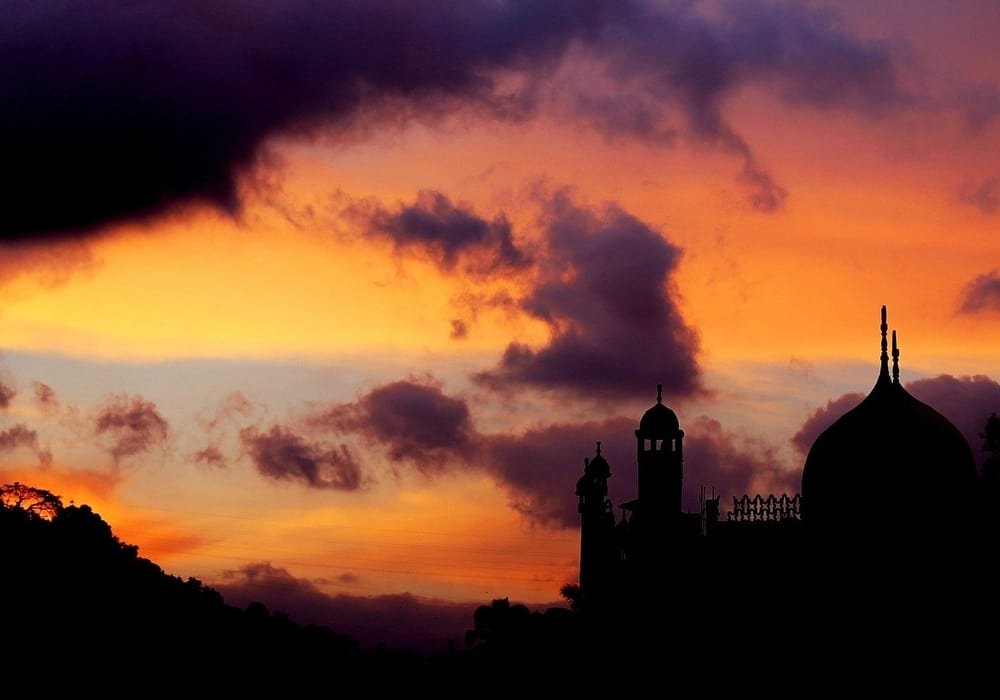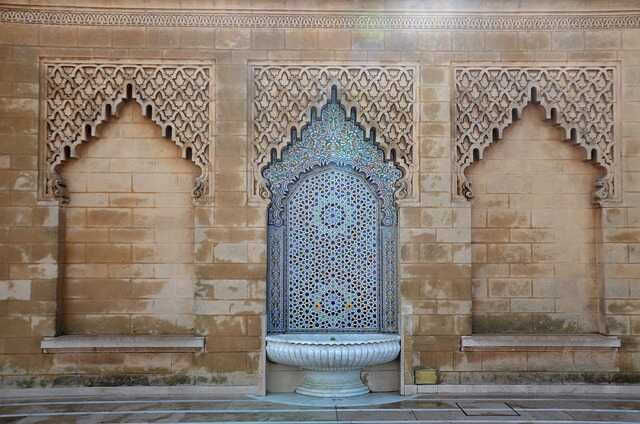Qunut Prayer
The word Qunut or Qunoot (الْقُنُوْتُ) is derived from the Arabic words “Qanata” which carries multiple meanings, one of which means ‘To Stand,’ ‘Silence,’ ‘Submissive and Humble To Allah’.
There are two types of Dua Qunoot or Qunut Prayer:
1. The Qunut prayer recited during Fajr prayer and Witr prayer (during the last 10 nights of Ramadan)
2. Qunoot Nazilah, which is specifically recited in times of calamity or seeking for Allah’s protection.
Originally Qunūt was a curse ritual in which the praying person raised his hand and asked God to destroy his enemies. When a large number of Muslims were massacred near Biʾr Maʿūna in 625, Muhammad himself is said to have cursed the tribe of Banu Sulaym, who were responsible for the massacre, during the dawn prayer or witir prayer in the form of Qunut for a month. Also ‘Alī ibn Abi Talib and Mu’awiya I had to curse each other during their dispute over the leadership of the Islamic community with Qunut.
Qunut Prayer (Dua Qunoot) with Arabic/English Transliteration
Dua e Qunoot (recited in Witr prayer) – 1
اللهُمَّ اهْدِنِي فِيمَنْ هَدَيْتَ
Allāhummah-dinī fīman hadait
وَعَافِني فِيمَنْ عَافَيْتَ
Wa ‘āfinī fīman ‘āfait
وَتَوَلَّنِي فِيمَنْ تَوَلَّيْتَ
Wa tawallanī fīman tawallait
وَبَارِكْ لِي فِيماَ أَعْطَيْتَ
Wa bārik lī fīman a’atoit
وَقِنِي شَرَّ مَا قَضَيْتَ
Wa qinī syarra mā qadhait
فَإنَّكَ تَقْضِي وَلاَ يُقْضَى عَلَيْكَ
Fa-innaka taqdī wa lā yuqdho ‘alaik
وَإِنَّهُ لاَ يَذِلُّ مَنْ وَالَيْتَ
Wa innahu laa yazillu man wālait
وَلاَ يَعِزُّ مَنْ عَادَيْتَ
Wa lā ya’izzu man ‘ādait
تَبَارَكْتَ رَبَّنَا وَتَعَالَيْتَ
Tabārakta Rabbana wa ta’ālait
فَلَكَ الْحَمْدٌ عَلى ما قَضَيتَ وَأَسْتَغْفِرُكَ وَأََتُوبُ إِلَيْكَ
Falak-al-hamdu ‘alā mā qadhaita, wa astaghfiruka wa atūbu ilaik
وَصلَّى اللهُ عَلىَ سَيًّدًنَا مُحَمَّدٍ النَّبِيِّ الأُمِّيِ وَعَلَى آلِهِ وَصَحْبِهِ أَجْمَعِينَ
Wa sallallāhu ‘alā sayyidinā Muhammadin Nabiyyil ummīyi wa ‘alā ālihi wa sahbihi ajma’īn
Meaning:
O Allah, guide me with those whom You have guided, and grant me wellbeing with those whom You have granted wellbeing. Take me to Your care with those whom You have taken to Your care. Bless me in what You have given me. Protect me from the evil You have ordained.
Surely, You hold the command and are not commanded, and none whom You have committed to Your care shall be humiliated. And none whom You have taken as an enemy shall taste glory. You are blessed, Our Lord and Exalted. All I praise is upon You for what You decide.
I seek Your forgiveness and I repent unto You. Peace and blessings be upon our Prophet Muhammad and upon his family and all his Companions. And praise be to Allah Lord of all the worlds.
Amar Makruf Nahi Mungkar: Promoting Goodness and Forbidding Evil in Islam
2. Dua Qunoot Nazilah
اللهُمَّ اهْدِنَا فِيمَنْ هَدَيْتَ
Allāhummah dinī fīman hadait
وَعَافِنَا فِيمَنْ عَافَيْتَ
Wa ‘āfini fīman ‘āfait
وَتَوَلَّنَا فِيمَنْ تَوَلَّيْتَ
Wa tawallanī fīman tawallait
وَبَارِكْ لَنَا فِيماَ أَعْطَيْتَ
Wa bārik lī fīman a’atoit
وَقِنَا شَرَّ مَا قَضَيْتَ
Wa qinī syarra mā qadhait
فَإنَّكَ تَقْضِي وَلاَ يُقْضَى عَلَيْكَ
Fa-innaka taqdī wa lā yuqdho ‘alaik
وَإِنَّهُ لاَ يَذِلُّ مَنْ وَالَيْتَ
Wa innahu lā yazillu man wālait
وَلاَ يَعِزُّ مَنْ عَادَيْتَ
Wa lā ya’izzu man ‘ādait
تَبَارَكْتَ رَبَّنَا وَتَعَالَيْتَ
Tabārakta Rabbanā wa ta’alait
فَلَكَ الْحَمْدٌ عَلى ما قَضَيتَ وَنَسْتَغْفِرُكَ وَنَتُوبُ إِلَيْكَ
Falak-al hamdu ‘alā mā qadhait, wa astaghfiruka wa atūbu ilaik
اللهُمَّ إِنَّا نَعُوذُ بِكَ مِنْ جهْدِ الْبلاء وَدَرْكِ الشِّقَاءِ، وَسُوءِ الْقَضَاءِ، وَشَمَاتَةِ الأَعْدَاءِ
Allāhumma innā na’uzubika min jahdil-balā’, wa darkish-shiqā’, wa sūi’l-qadhā’, wa shamātatil-a’dā’.
اللهُمَّ إِنَّا نَعُوذُ بكَ مِنْ زَوَالِ نِعْمَتِكَ، وَ َتَحَوُّلِ عَافِيَتِكَ، وَفُجَاءَةِ نِقْمَتِكَ، وَجَمِيعِ سَخَطِكَ
Allāhumma innā na’ūzubika min zawāli n’imatik, wa tahawwuli ‘āfiyatik, wa fujā-ati niqmatik, wa jamī’i sakhatik
اللهُمَّ ادْفَعْ عَنَّا البَلاَءِ وَالوَبَاءِ وَالزَّلاَزِلَ وَالمِحَنِ، مَا ظَهَرَ مِنْهَا وَمَا بَطَنَ، عَنْ بَلَدِنَا خَاصَّة، وَسَائِرِ الْبُلْدَانِ عَامَّةً
Allāhumma-idfa’ ‘annal-balā’ wal-wabā’ waz-zalāzila wal-mihan, ma zhohara minhā wa mā baton, ‘an baladinā khāssah, wa sā-iril buldāni ‘āmmah
اللهُمَّ اكْتُب السَّلاَمَةَ وَالعَافِيَةَ لَنَا وَلِجَمِيعِ الْبُلْدَانِ عَامَّةً يَارَبَّ العَالمينَ
Allāhumma-ktubis-salāmata wal-‘āfiyata lanā wa li jami’il-buldāni ‘āmmah. Ya Rabbal-‘ālamīn
اللهُمَّ انْصُرِ الْمُسْتَضْعَفِينَ فِي كُلِّ مَكَان، يَا أَرْحَمَ الرَّاحِمِينَ
Allāhumman-suril-mustadh’afīna fī kulli makān. Ya Arhama-rrāhimin
رَبَّنَا آتِنَا فِي الدُّنْيَا حَسَنَةً، وَفِي الآخِرَةِ حَسَنَةً، وَقِنَا عَذَابَ النَّارِ. وَصَلَّى اللهُ عَلىَ سَيِّدِنَا مُحَمَّدٍ وَعَلَى آلِهِ وَصَحْبِهِ وَسَلَّم
Rabbanā ātina fid-dunya hasanah, wa fil-ākhirati hasanah, wa qina ‘azaban-nār. Wa salallāhu ‘alā sayyidinā Muhammad wa ‘alā ālihi wa sahbihi wa sallam.
Meaning:
O Allah, guide me with those whom You have guided, and grant me wellbeing with those whom You have granted wellbeing. Take me to Your care with those whom You have taken to Your care. Bless me in what You have given me. Protect me from the evil You have ordained.
Surely, You hold the command and are not commanded, and none whom You have committed to Your care shall be humiliated. And none whom You have taken as an enemy shall taste glory. You are blessed, Our Lord and Exalted. All I praise is upon You for what You decide. I seek Your forgiveness and I repent unto You.
Oh Allah, I seek refuge in You from the distress of trial, from the lowest level of misery, from the perversity of fate, and from the malicious rejoicing of enemies.
O Allah, I seek refuge in You from the withdrawal of Your blessing and the change of Your protection (from me) and from the sudden wrath of You, and from every displeasure of You.
O Allah, lift from us the calamity, the pandemic, the disasters and the tribulations, of which is apparent and which is hidden, especially from our country and other countries.
O Allah, grant us and the countries around us the safety of our well-being.
O Allah, grant victory to the oppressed in all places.
Our Lord, give us in this world [that which is] good and in the Hereafter [that which is] good and protect us from the punishment of the Fire. And Peace and blessings upon our Prophet Muhammad and upon his family and all his Companions.
3. Other Duas that we can recite in Qunoot
Seeking Allah for the purification of the soul
dua qunoot meaning in english
اللهُمَّ آتِي نَفْسِي تَقْوَاهَا وَزَكِّهَا أَنْتَ خَيْرُ مَنْ زَكَّاهَا، أَنْتَ وَلِيُّهَا وَمَوْلَهَا
Allāhumma āti nafsī taqwāha, wa zakkihā anta khairu man zakkāha, anta waliyyuhā wa maulāhā
O Allah! Grant me the sense of piety and purify my soul as You are the Best to purify it. You are its Guardian and its Protecting Friend.
(Sahih Muslim)
CAN QUNUT PRAYER BE FOUND IN THE QURAN?
No, the prayer of Qunut is not mentioned in the Qur’an, it is the Sunnah of the Prophet (ﷺ).
SOURCES OF QUNUT FROM HADITH
1. Qunut at Dawn – Narrated Muhammad bin Seereen: Anas was asked, “Did the Prophet (ﷺ) recite Qunut in the dawn prayer?” Anas said yes. He was asked further, “Did he recite Qunut before bowing?” Anas replied, “He recited Qunut after bowing for some time (for a month).” Sahih al-Bukhari 1001
2. Qunut in Subh and Maghrib prayers-Al-Bara bin Azib narrated: “The Prophet (S) will perform Qunut in Subh and Maghrib prayers.” Sahih (Darussalam) Jami At-Tirmidhi 401
3. Qunut in Witr during the third rak’ah – It was narrated from Ubayy bin Ka’b that: Rasulullah (ﷺ) used to pray witr with three rak’ahs. In the first part he will recite: “Praise the Name of your Lord Most High” in the second part: “Say: O disbelievers!”, And the third: “Say: He is Allah, (the) One”. And he will recite Qunut before bowing, and when he finishes he will say: Subhanal-Malikil-Quddus (Praise be to the Sovereign, the Most Holy) three times, extending the words last time. Sahih (Darussalam) Sunan an-Nasa’i 1699
4. Qunut in Witr – Abu Dawud said: This version of the hadith is not very well known. There is doubt that Hafs may have narrated this hadith from a narrator other than Mis’ar. Abu Dawud said: It is reported that Ubayy (b. Ka’b) used to recite prayers (in witr) in the second half of Ramadan. Sahih (Al-Albani) Name of Abi Dawud 1427
5. What sources should be read in Qunut-Narrated Al-Hasan ibn Ali: The Messenger of Allah (ﷺ) taught me some words that I said during witr. (Ibn Jawwas’s version has: I say it in the request of witr.) They are: “O Allah, guide me among those whom You have guided, give me security among those whom You have given security, take me into Your responsibility in among those whom Thou hast taken, bless me in what Thou hast given, protect me from the evil of what Thou hast decreed, because of Thy Decree, and nothing is decreed for Thee. He who is Your friend is not humbled. Blessed and glorified are You, our Lord. ”Sahih (Al-Albani) Name of Abi Dawud 1425
6. Qunut Before or After Ruku – It is narrated that Anas bin Malik said: He was asked about Qunut in the Subh prayer, and he said: “We used to recite Qunut before Ruku ‘and after.” Hasan (Darussalam) Sunan Ibn Majah 1183
Sources: PinterPandai, Islam Suci Beriman, My Islam
Photo credit: Pixabay
How many Sajda is there in the Quran and in which Sura is each Sajda?


